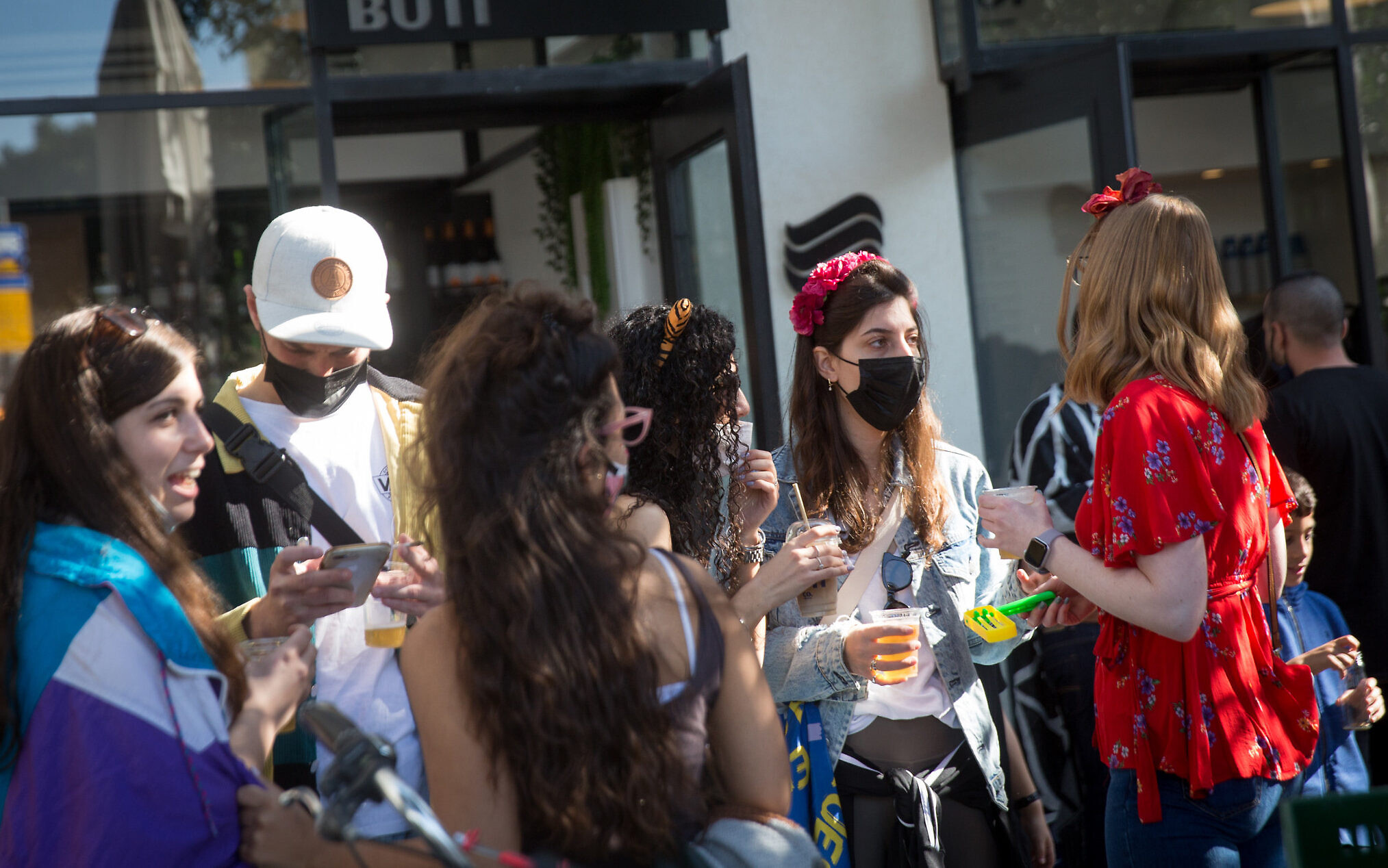Revelers stream into capital as virus transmission rate ticks upward; police enter ultra-Orthodox neighborhood to remove hanged effigy of officer
Public transportation and private buses for revelers were prevented from entering or leaving the capital, spurring many people, including families, to walk to the city for Purim parties.
The statement did not say where those arriving were walking in from, but they were presumably arriving from nearby areas where the transportation ban was not in effect.
Authorities are particularly concerned about “tisch” celebratory gatherings slated to take place throughout ultra-Orthodox communities. These have been virus hotspots all year, with many repeatedly flaunting government guidelines.
But Sunday also saw non-Haredim gather in large crowds in the city for banned parties.
The holiday ended in most of the country on Saturday, and a three-night curfew set in place for the holiday expired on Sunday morning. But Shushan Purim celebrations held in walled cities such as Jerusalem last a day longer, leading to restrictions being extended in the capital.
A large police presence was reported in Jerusalem’s ultra-Orthodox Mea Shearim neighborhood, but officers were not expected to stringently enforce lockdown rules during the final day of the holiday.
One resident of Mea Shearim told the Ynet news site, “There’s no need for the country to worry about the health of Mea Shearim’s residents.”
“We’re doing what they’re doing in Tel Aviv,” he said, referring to recent outdoor parties in the coastal city.
Police entered Mea Shearim to take down an effigy of a police officer that neighborhood residents had hung from a wire above a city street. Officers took it down and removed it from the neighborhood.
Video from the neighborhood showed a long line of police streaming in, while residents, wearing Purim costumes but no face masks, called them “Nazis.”
כוחות משטרה נכנסו לשכונת מאה שערים בירושלים כדי להוריד בובה בדמות שוטר. השוטרים נתקלו בצעקות "נאצים"@SuleimanMas1 @VeredPelman (צילום: מחאות החרדים הקיצוניים) pic.twitter.com/5HDAKjxLyW
— כאן חדשות (@kann_news) February 28, 2021
Police arrested several people during the foray into Mea Shearim, Kan News reported.
Reports said residents were circulating between different “tisch” gatherings in the neighborhood.
Thousands of Hasidic worshipers were reportedly attending a gathering for the Admor of Gur in Jerusalem on Sunday. Participants said entrance was only allowed “for vaccinated people and those who recovered” from COVID-19.
Parties were also held by non-Haredi Jerusalemites: The capital’s Mahane Yehuda outdoor market was crowded, and hundreds of people also gathered in the Nahlaot neighborhood for a street party, mostly not wearing masks or keeping social distance. Police confiscated speakers from one of the partygoers, then left the scene and tried to clear a road, leading to minor scuffles.
מסיבת הרחוב בנחלאות: המשטרה הגיעה לפזר את ההתקהלות והחרימה רמקול@SuleimanMas1 https://t.co/waN6mHpaFT pic.twitter.com/A67ArYhGUj
— כאן חדשות (@kann_news) February 28, 2021
מסיבת הרחוב בנחלאות: המשטרה ניסתה לפנות את הכביש מהמוני החוגגים – עימותים התפתחו @SuleimanMas1 https://t.co/waN6mHpaFT pic.twitter.com/xqd9UHpauN
— כאן חדשות (@kann_news) February 28, 2021
The government has urged the public to avoid parties during the holiday, with the coronavirus far from being under control and infection indicators once again on the rise. Officials have warned that it is not yet clear that vaccination prevents one from carrying the pathogen, and thus fully inoculated people who are not careful could still be a danger to others.

But much of the public, some emboldened by the vaccination campaign, has ignored the government’s appeals and police have struggled to clamp down on dozens of daily Purim parties in recent days that have drawn mass crowds.
Hundreds took part in spontaneous street parties in Tel Aviv and Jaffa on Friday and Saturday with no social distancing and few masks in sight.
The celebrations came as Israel’s virus transmission rate has continued to rise and is extremely close to showing expanded spread, data released by a military task force showed on Sunday.
In its latest report, the Military Intelligence taskforce said Israel’s coronavirus transmission rate was once again nearing 1, standing at 0.99. The rate had dipped to a low of 0.8 earlier this month.
The basic reproduction number, or R-number, is the number of new cases stemming from each coronavirus infection, or the number of people who caught the virus from each infected person. Any number lower than 1 means the pandemic is slowing down, while a number above 1 means it is accelerating. The figures are based on new case numbers from 10 days earlier due to the virus’s incubation period.

Large sections of the economy were reopened last week and health officials are set to discuss further easing virus restrictions.
The next stage of restriction-easing is slated to take place on March 7 and includes the reopening of restaurants for seating. But if case numbers remain high and the healthcare system is once again strained, reopening plans will have to be delayed, health officials said.
The Health Ministry on Sunday said that 3,690 people were diagnosed with COVID-19 on Saturday and an additional 1,429 people since midnight, taking the total number of cases in Israel to 774,479. The number of active cases in Israel now stands at 40,108. Saturday’s results, which came from just 24,291 tests, represented a positive infection rate of 6 percent.
The number of serious cases on Sunday stood at 776, the lowest recorded number since the beginning of the year, after it climbed to an all-time high of 1,201 in mid-January.
The death toll stood Sunday morning at 5,738.
